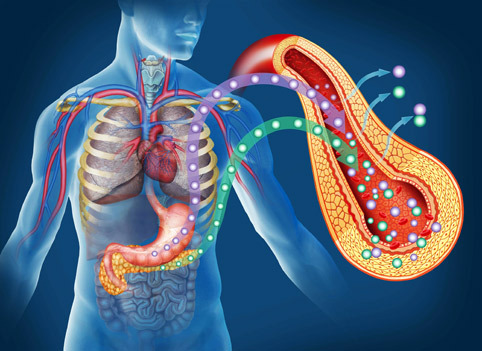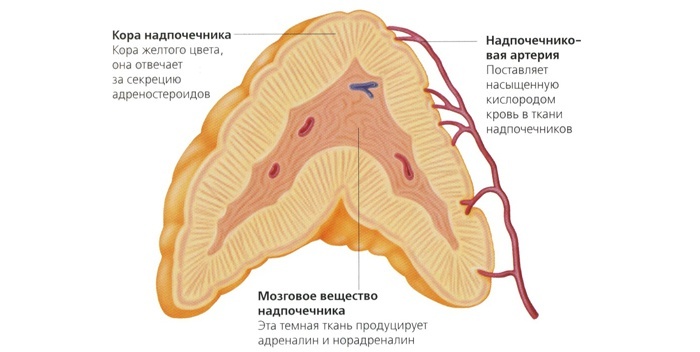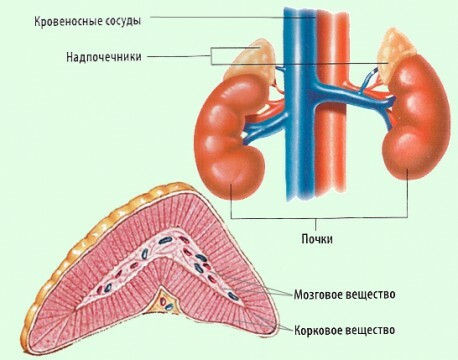In the human body, the hormone of the pancreas - insulin - plays an important role. It regulates metabolic processes, affects protein and fat metabolism, the metabolism of nucleic acids, normalizes the amount of glucose and carries out its transport. Therefore, it is so important that the level of this substance is always in the norm. Any imbalance in the amount of insulin in the body affects its condition and functions.
Regulation Mechanism

Insulin is deposited in the secretory granules of the Golgi complex. There it is stored in the form of "crystals", which are formed by the interaction of it and zinc ions.
Release of a substance from secretory granules occurs when the glucose concentration in the blood rises. In addition, the hypersecretion of the substance is affected by:
- certain amino acids( lucine and arginine);
- pituitary and adrenal hormones - glucose-dependent insulinotropic polypeptide( GIP), glucagon-like peptide-1( GLP-1);adrenocorticotropic hormone( ACTH) and others;
- increase in the concentration of Ca and K in the blood plasma;
- increased levels of fatty acids in the blood matrix.
The amount of insulin is reduced by the action of a hormone produced by pancreatic A cells - glucagon.
Coordination of the increase and decrease in the concentration of the hormone is carried out by the so-called autonomic nervous system. Parasympathetic system stimulates the production of insulin, sympathetic - inhibits. The causes of the increase in

The cause of the increase in the concentration of the substance may be a number of factors:
- benign pancreatic tumors( insulinomas),
- proliferation or stimulation of the β-cells of the islets of Langerhans,
- decrease in α-cell function and production of glucagon,
- , metabolic disorder of carbohydrates,
- pathology andliver diseases,
- polycystic ovary,
- pituitary pathology,
- abnormalities of the adrenal cortex,
- malignant abdominal cavity,
- stress,
- physicallye overload.
One of the main reasons for increasing insulin in the blood is obesity. It can lead to a breakdown and slowing of the metabolism of carbohydrates, a reduction in the digestibility of fats and their deposition, a deterioration of blood supply to organs, liver and kidney pathology.
Also cause a high amount of substance may be an imbalance of the hormonal background. The decrease in the production of hormones( corticotropin, somatotropin), the anterior pituitary gland and the adrenal cortex( glucocorticoid) provokes an increase in concentration.

The pathology of the central nervous system, a violation of the "switching" ability of the hypothalamus( the transformation of chemical signals into nerve and vice versa) causes a high concentration of the hormone.
An abnormal decrease in the sensitivity of insulin receptors on membrane cells of insulin-dependent tissues is also a cause of high insulin.
However, the main stimulator of its production is glucose. A high level of sugar in the blood stimulates several ways of signaling the β-cells to start producing hormones.
The increase in insulin in the body of a woman during pregnancy is considered physiologically conditioned due to the transition of the body to a new condition.
Causes of high blood sugar level
Such a rare neuroendocrine disease as acromegaly is accompanied by a high level of hormone with normal sugar in the blood. With acromegaly, the proliferation of tissues is accompanied by compression of nerves( tunnel syndrome) and a decrease in the sensitivity of insulin-dependent receptors. To normalize their functioning, the body produces a large amount of insulin. At the same time, sugar in the blood is normal. The same mechanism is also used for gigantism.
Another disease in which the level of a substance rises without the influence of sugar is Isenko-Cushing's disease. As a result of the pathology of the pituitary gland, he produces an excessive amount of adrenocorticotropic hormone, which, in turn, affects the function of the adrenal glands. As a result, the adrenal glands increase in size, begin to intensively produce their hormones, which affect the concentration of insulin.

The diagnostic sign of a pancreatic tumor is an increase in the hormone with normal sugar. Insulinoma - a tumor that produces this hormone, is located in any part of the gland and can be located extropankreatically( outside the gland), for example in the omentum, in the spleen, intestine.
With polycystic ovaries, insulin resistance( not sensitivity) of the body develops and, as a result, compensatory increase in hormone production. With this disease, there is also no dependence of "insulin-glucose".
In liver diseases, the hormone clearance in this organ is impaired. In a normal state, the liver binds and destroys about 60% of insulin. Violation of this process leads to an increase in the level of the substance.
Stressing factors affect the level of insulin, through stimulating the production of the stress hormone - adrenaline. It inhibits the release of matter into the bloodstream and stimulates the compensatory work of the islets of Langerhans.
Many factors have an effect on insulin production, regardless of the level of glucose in the blood.
Precise work of the mechanism of regulation of insulin in the blood affects all body functions, health and life expectancy. A significant correlation was established between the life span and the level of this hormone. With his increased number of people live much less. The reason why this happens is an interesting addiction. A gene that determines the length of a person's life is also responsible for the production of insulin. Scientists believe that an overabundance of substance "switches" the genes of youth and old age. A large amount of carbohydrates and sugars in food leads to hyperproduction of insulin. Since most of the carbohydrates are not used, due to the illness of the century - hypodynamia, they are deposited by the hormone in the fat cells. The long-lasting high level of the substance leads to a decrease in the sensitivity of the receptors of the cell membranes, the cell function and, consequently, the degradation of the tissues are disrupted, which ultimately leads to premature death.
Thus, controlling the level of insulin in the body is a vital necessity.



